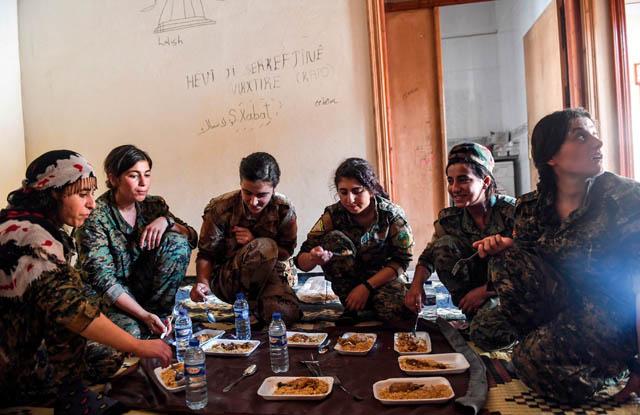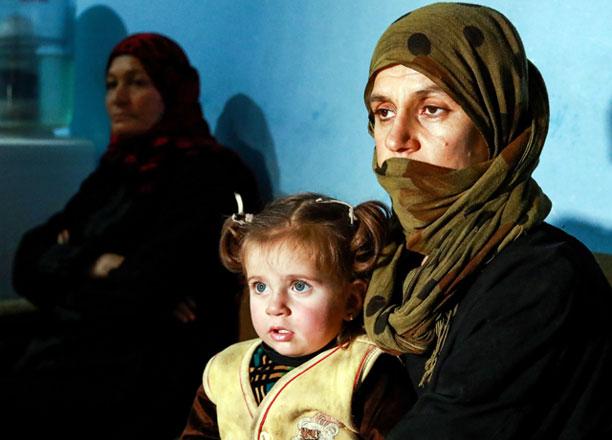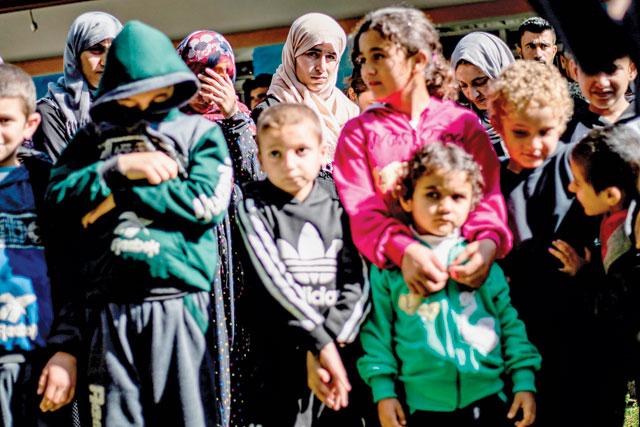You are here
Sold by Daesh in Raqqa, Yazidi female fighters back for revenge
By AFP - Jul 21,2017 - Last updated at Jul 21,2017

Members of the Women’s Protection Units eat on the eastern outskirts of Raqqa on Tuesday during the ongoing offensive by the Syrian Democratic Forces to retake the city from the Daesh group (AFP photo)
RAQQA, Syria — She was trafficked into Raqqa as a sex slave by the Daesh terror group but managed to escape. Now Yazidi fighter Heza is back to avenge the horrors she and thousands of others suffered.
Her hair tucked under a tightly wrapped forest green shawl embroidered with flowers, Heza says battling Daesh in its Syrian bastion has helped relieve some of her trauma.
“When I started fighting, I lifted some of the worries from my heart,” she says, surrounded by fellow Yazidi militia women in Raqqa’s eastern Al Meshleb district.
“But it will be full of revenge until all the women are freed.”
She and her two sisters were among thousands of women and girls from the Kurdish-speaking Yazidi minority taken hostage by Daesh as it swept into Iraq’s Sinjar region in August 2014.
The women were sold and traded across the extremists’ self-proclaimed “caliphate” in Syria and Iraq. Around 3,000 are believed to remain in captivity, including one of Heza’s sisters.
“When the Yazidi genocide happened, Daesh snatched up the women and girls. I was one of them,” Heza recounts.
The United Nations has qualified the massacres Daesh carried out against the Yazidis during the Sinjar attack as genocide.
Daesh separated Yazidi females from the men in Sinjar, bringing the women and girls into Raqqa.
“They took us like sheep. They chased us and humiliated us in these very streets,” Heza tells AFP, gesturing to a row of heavily damaged homes in Al Meshleb.
The eastern district was the first neighbourhood captured from Daesh by the US-backed Syrian Democratic Forces (SDF), a Kurdish-Arab alliance, in their months-long offensive to seize the extremist bastion.
SDF officials told AFP that their forces had already rescued several female Yazidi captives, including a 10-year-old girl, since they entered Raqqa city in June.
‘Despite pain, I felt joy’
Over the course of her 10-month captivity in Raqqa, Heza was bought by five different Daesh fighters.
Her voice strained but her brown eyes still sharp, the young fighter says she prefers not to detail the abuses she suffered.
But in an indication of the extent of her trauma, Heza — whose name means “strength” in Kurdish — says she tried to commit suicide several times.
Finally, in May 2015, she escaped from the home where she was being held to a nearby market, and she found a Syrian Kurdish family who smuggled her out of the city.
She travelled around 400 kilometres across war-ravaged northeast Syria back into Iraq to join the Shengal Women’s Units (YPS).
The YPS — named after the Kurdish word for Sinjar — is a part of the US-backed SDF.
Heza underwent intensive weapons training, and when the SDF announced its fight for Raqqa in November 2016, she and other YPS fighters were ready.
“When the Raqqa offensive began, I wanted to take part in it for all the Yazidi girls who were sold here in these streets,” she says.
“My goal is to free them, to avenge them.”
The SDF spent months tightening the noose around Raqqa before breaking into the city in June, and the YPS took up their first positions in Al Meshleb several weeks later.
It was the first time Heza was back in the northern Syrian city since her escape.
“When I entered Raqqa, I had a strange, indescribable feeling. Despite the enormous pain that I carry, I felt joy,” the fighter says.
‘Revenge will be proportional’
Rifles are lined up in neat rows inside the abandoned home used by the YPS as their base in Al Meshleb.
Yazidi women in brand-new uniforms gather around a crackling walkie-talkie for news from the front.
Some of them, like 20-year-old Merkan, have travelled far to join the fight against Daesh.
Her family is originally Yazidi Turkish, but Merkan and her 24-year-old sister Arin were raised in Germany.
When they heard about Daesh’s infamous sweep into Sinjar in 2014, they were outraged.
“I could never have imagined a world like this. I didn’t expect things like this could happen,” Merkan says.
“I was in so much pain,” says the tall militiawoman.
Her older sister decided to travel to Sinjar in late 2014 to join the YPS, and Merkan followed in early 2015.
“I only had one goal in front of me: liberating the Yazidi women, and all women who were still in Daesh’s clutches.”
She had scribbled a similar pledge in Kurdish on a wall behind her.
“Through strength and struggle, we Yazidi women fighters came to Raqqa to take revenge for the August 3 massacre,” the graffiti says, referring to when Daesh entered Sinjar.
“We are avenging Yazidi girls,” it adds.
“Yesterday there was Al Qaeda and today there’s Daesh. We don’t know who will come next. I want to go anywhere there is injustice,” Merkan said.
Fellow fighter Basih is sitting quietly in a neighbouring room, chain-smoking cigarettes in the muggy July afternoon.
“We suffered the ugliest forms of injustice. Our revenge will be proportional to it,” she said.
Related Articles
OMAR OILFIELD, Syria — Among thousands fleeing the crumbling dream of a Daesh group ‘‘caliphate’’ in eastern Syria are alleged terrori
BEIRUT — A viral photo shows her celebrating the capture of Raqqa, but Rojda Felat is more than a poster girl: she commanded thousands of fi
QAZLAJKOH, Syria — Syrian Kurds on Saturday repatriated 25 women and children from Iraq’s Yazidi minority after freeing them during the

















